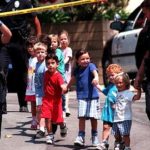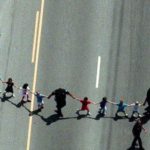Almost 20 years ago, shortly after the Columbine High School shootings, terror in the form of a neo-Nazi attack came to the Los Angeles Jewish Community Centers. The two incidents were the earliest mass shootings of children covered by the 24 hour cable news channels. Though the incidents would mobilize concerned parents to create the Million Mom March the following year, neither they nor the dozens of other shootings and subsequent protests have led to the adoption of common sense gun regulation. My heart cries for the victims and their families. My husband was then the Director of the JCC, and he gave this Dvar Torah shortly after the shooting. Maybe it will light a spark of responsibility among our lawmakers?
In June of this year, I stood to address 100 young counselors at the staff training for the Jewish Community Center summer camps. My task, in the 10 minutes allotted to me, was to give some larger meaning to the summer work experience that was about to begin for these teen and college age employees, some of whom were brand new to this kind of work. My first job as a teenager was as a camp counselor, but that wasn’t the story I would tell.
Instead, I read to them about Janusz Korczak’s trepidation and enthusiasm during his first summer as a camp counselor at the turn of the century. I shared how he had gone on to become a doctor and one of Europe’s leading advocates for children’s rights, but that he was most remembered for the final act of his life. Declining opportunities to save himself, he had comforted the orphans of the Warsaw Ghetto as they walked to the transports that would take them all to the death chambers of Auschwitz. Indeed, I concluded, Janusz Korczak’s life long commitment to helping children began at a summer camp for impoverished boys, and that his life is the heroic context that can frame their work at camp this summer.
The presentation over, I returned to my administrative duties, and the counselors went off to the buses, the pools, and the song sessions. That is, until, August 10, 1999.
On that day, a neo-Nazi entered the Jewish Community Center in Granada Hills. In a matter of seconds, he fired over 70 bullets in a terrifying act of hate. Five people were wounded, but the children were protected.
The most senior staff member on the grounds at the time of the attack was the Assistant Director of the Camp. He was a young man who had come to this country as a refugee from Vietnam. He had grown up in the summer camps of the Jewish Community Centers of Los Angeles, and now, in his first full time job, the responsibility for coordinating the evacuation efforts fell to him. Over the walkie-talkie, he called for counselors to immediately evacuate to adjacent institutions, but to do so without scaring the children. The buses, readying to leave on a field trip, were quickly filled with children. They exited in seconds, the children wondering what the loud banging sounds were, but having seen little or none of the carnage. Other counselors, with their groups, ran to adjacent institutions to seek safety. In moments, most of the day camp children were safely off the grounds of the Jewish Community Center.
The teachers in the preschool had a more difficult challenge. Their children were younger, many in diapers. On hearing the attack, they quickly assembled the toddlers and prekindergarteners, and took them “hand in hand” to safe areas away from the attack. Selflessly, the children were protected. In the lobby, volunteers, and employees exposed themselves to risk by sheltering the wounded. The police arrived on the scene in less than 4 minutes, and immediately entered the building to protect the children. Fire department personnel followed to administer emergency aid. All of these adults, professional and volunteer, acted without hesitation, the children’s safety being their paramount concern.
But the counselors were our children too. Many had grown up in our camps. For some, not only was this was their first job, but also the first time they weren’t campers. Most were students in high school. The camp supervisors were just juniors and seniors in college. Many had younger siblings enrolled in the camp. And they, like the responsible adults, acted selflessly and only with concern for the safety of the children. Their courage and moral character was tested, and they responded, to a person, with leadership, wisdom, and empathy.
Do they remember the story of Janusz Korczak? Maybe, but by their actions on August 10,1999, their lives are forever linked to his. Our children saved our children!




